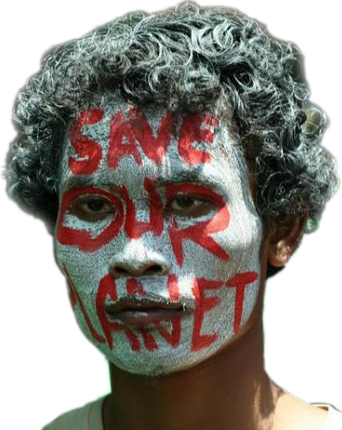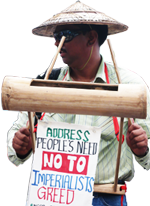| IBON International Climate Update 1 (Doha) |
 |
 |
|
| Friday, 30 November 2012 11:53 |
|
Climate, Number 1
Doha, Thursday, November 29, 2012
The 18th meeting of the Conference of Parties (COP) to the United Nations Framework Convention on Climate Change (UNFCCC) opened this week in Qatar. More pressure than ever before rests on this COP process ending with a meaningful outcome characterized by developed country ambition in achieving emissions reductions, equity between developed and developing countries in emission reductions and climate financing, and legally-bindingcommitments on all of these.
The weeks leading up to the conference have underscored the stark situation faced by the world - in particular the poor and marginalized of the Global South - without immediate and concerted efforts to tackle climate change. The World Bank has warned of a 4C temperature rise by 2100, and projected a 3C rise if current pledges are adhered to; the United Nations Environment Program (UNEP) warned that without swift action we are on track to exceed by some 32 percent the level of carbon emissions needed to ensure reductions in emissions can take place at a “manageable cost” in 2020; the International Atomic Energy Agency (IAEA) warned that two-thirds of known fossil fuel reserves must remain in the ground to avoid a 2C temperature rise by 2100.
|
| Read more... |
|
| IBON Climate Updates No.5: Bangkok Climate Change Conference 2012 |
 |
 |
|
| Wednesday, 05 September 2012 10:40 |
|
(Bangkok, Sept. 4) – More ambiguity than clarity, and yet the picture is becoming clearer than ever. After several sessions of the contact group on finance under the Ad Hoc Working Group on Long Term Cooperative Action (AWG-LCA), it is becoming clearer that developed countries are exerting such tremendous effort in making surethat no substantive discussion and decision regarding the future of climatechange financing would be reached in Bangkok, and perhaps not even at the COP 18 in Doha this end-November. And this certainly does not bode well for communities especially in the developing countries who are already experiencing the impacts of climate change – of people who desperately are in need of resources to enable them to survive the impacts of floods, droughts and other effects of climate change.
At this morning’s discussion of the AWG-LCA contact group on finance, the Chair Mr. Aysar Tayeb, tried to focus the discussions on the issue of the arrangement between the Conference of Parties (COP) and the Green Climate Fund (GCF). It may be remembered that the GCF was established at the COP 16 in Cancun and is envisioned to be the principal form of the climate financial mechanism, and not simplyjust one among the many climate funds in operation. But it has yet to take off the ground, having been saddled by issues around sources of funds,legal mandate, and many other issues.
|
| Read more... |
| IBON Climate Updates No.4: Bangkok Climate Change Conference 2012 |
 |
 |
|
| Tuesday, 04 September 2012 09:46 |
|
(Bangkok, September 2) – With only 3 more days left at the Bangkok informal additional sessions, there are a number of outstanding issues where developed and developing country negotiators appear to be reading the same book, but one that has different versions and editions. And if these differences weren’t enough, they are not all on the same page, to say the least.
Take for instance the Open-ended informal consultation by H.E. Mr. Abdullah Bin Hamad Al-Attiyah, the President Designate of COP 18/CMP 8 on the expectations of Parties and observers for the Doha Climate Conference set to be held in end-November in Qatar.
Mr. Abdullah Bin Hamad Al-Attiyah started the consultation by saying that we are close to concluding an important milestone on the road to Doha. He said that the Doha outcome would want to see balanced progress on all tracks (referring to the Ad hoc Working Groups on Long term Cooperative Action (LCA), Kyoto Protocol (KP), and the Durban Platform (ADP). He recognizes that this will not be easy, and that there are important political choices to bemade. Overall, he said that there is ‘optimism and an understanding for the need for compromise to preserve the multilateral system for the future generations.’
|
| Read more... |
| IBON Climate Updates No.3: Bangkok Climate Change Conference 2012 |
 |
 |
|
| Monday, 03 September 2012 11:27 |
|
(Bangkok, Sept. 1, 2012) – There is probably nothing more compelling and interlinked and yet increasingly pitted against each other in the ongoing climate negotiations than the twin imperatives of equity and ambition.
Equity is at the core of the UN Climate Convention, and Parties have an obligation to uphold this tenet. This means acknowledging that developed countries that have contributed the most to the climate crisis have a historical responsibility to take the lead in cutting emissions, as well as to provide finance and technology to developing countries (and their peoples) who are suffering from the impacts of climate change. This is in keeping with the principle of ‘common but differentiated responsibilities and respective capacities’ (CBDR) agreed upon in 1992.
|
| Read more... |
| IBON Climate Updates No.2: Bangkok Climate Change Conference 2012 |
 |
 |
|
| Monday, 03 September 2012 11:21 |
|
(Bangkok, August 31,2012) – ‘To kill, or not to kill’, while millions more are dying with the impacts of climate change. This seems to be the undercurrent yesterday at the Bangkok Intersessionals of the United Nations Framework Convention on Climate Change (UNFCCC).
At the Contact Group meeting for finance, developed countries, particularly the Umbrella Group composed of the US, Australia, New Zealand, Canada, Japan and supported by the European Union, Switzerland and Mexico, raised a number of procedural questions for continuing to tackle climate finance at the Ad HocWorking Group on Long-term Cooperative Action (AWG-LCA). Arguing that everyfinance issue has an appropriate forum where each of the different finance issues can be addressed, they put forward the view that the LCA’s work on finance should end this year, as mandated by the Durban outcomes. Having a number of meetings on finance at the LCA, to these countries, is a ‘misallocation’ of time.
|
| Read more... |
| Civil Society Views on Observer Participation and Rules of Procedure of the 1st GCF Board Meeting |
 |
 |
|
| Monday, 03 September 2012 10:33 |
|
31 August, 2012
In response to the invitation of the co-chairs at the first meeting of the Board of the Green Climate Fund in Geneva, the following constitutes recommendations on the interrelated issues of observer participation and rules of procedure from a multi-constituency group of CSOs registered as observers for the first GCF Board meeting, as well as other CSOs informed and consulted after the meeting.
|
| Read more... |
|
|
More Articles...
- IBON Climate Updates No.1: Bangkok Climate Change Conference 2012
- Oil Exploration: Boon or Bane for Manipur
- Loss and damage: Defining slow onset events
- Loss and Damage: Some key issues and considerations
- Loss and damage: key issues and considerations for the Bangkok regional expert meeting
|
|
| Page 3 of 25 |
 The Peoples' Movement on Climate Change (PMCC) seeks to advance the People's Protocol on Climate Change as the Southern peoples' strategy and response to the climate change issue.
The Peoples' Movement on Climate Change (PMCC) seeks to advance the People's Protocol on Climate Change as the Southern peoples' strategy and response to the climate change issue.



